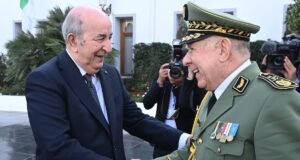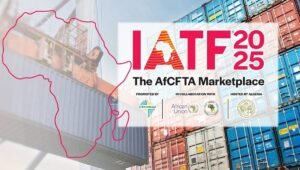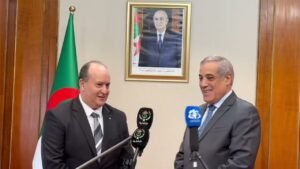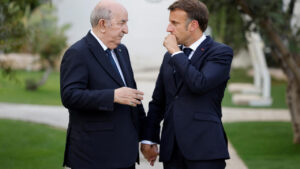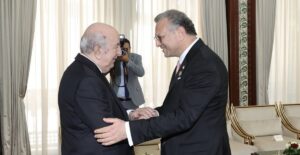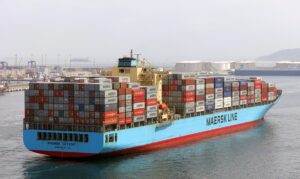"Algeria's economy is Africa's third-largest"...a stark example of President Tebboune's misleading figures!!

Algerian President Abdelmadjid Tebboune is still waging a premature "election campaign" in a "desperate" attempt to secure the endorsement of the warring factions within the military regime for a second term. He is using his favorite game of promoting "fake" victories, aided by the official media at his disposal. Despite the stark reality, known to every Algerian, that failure has accompanied all of President Tebboune's initiatives and decisions, and despite his conviction that the blessing of the powerful General Mohamed Toufik (Medine), who runs the presidential game through his intelligence men—Generals Djebbar Mehna, Nacer El-Jen, and Hussein Boulehia—is almost improbable, if not impossible, he (President Tebboune)—given his previous experience as Minister of Information during the Black Decade—has grown accustomed to the game of misleading numbers and statistics, which find no one to review or correct them, despite the blatant contradictions they contain in most cases. The latest of these propaganda campaigns, lined up by the regime's propaganda mouthpieces, claims that Algeria has become "the third largest economic power in Africa," behind South Africa and Egypt, and ahead of Nigeria. This is based on "forecasts" recently announced by the International Monetary Fund, and the "drumrolling" of Tebboune's success in increasing Algeria's GDP over three years (they exclude the two years of the coronavirus pandemic from their calculations!!) from $163 billion to $266 billion!! This calls for an attempt to examine the credibility of this claim, with a little scrutiny and calm.
First, it must be emphasized that a country's gross domestic product (GDP) is just one of several equally important indicators of the health and strength of a country's economic situation. Per capita income, the volume and structure of exports, the total government debt (domestic and external), the ratio of this debt to the gross domestic product (GDP), the inflation rate, and others are no less important than the first indicator. Indeed, the economic situation cannot be understood in isolation from these figures combined. Second, the accuracy of these figures depends primarily on the accuracy and transparency of government statistics and figures for each of these indicators. Thus, in closed systems with a command economy—of which Algeria is one—which lack independent institutions to monitor and verify these figures, there are many justifications for skepticism regarding the "propaganda" figures issued by these countries, which are typically used to conceal the regime's failures, its mismanagement of the country's resources, and the overall effectiveness of its economic policies. The third of these observations, related to the previous one, states that there is a significant “discrepancy” between the estimates of all these figures issued by international institutions, whether they are the International Monetary Fund, the World Bank, the United Nations and its specialized agencies, or prestigious academic economic institutions. These institutions, in turn, issue estimates and figures that are the sum of dozens of private sources of information, compiled by specialized researchers, making their services in demand and respected to a degree almost greater than their official predecessors.
Returning to the propaganda of “Africa’s third-largest economy,” promoted by President Tebboune and his media outlets, we will quickly attempt to make some observations that will help us clarify the reality of the “supposed” tremendous growth in Algeria’s gross domestic product during President Tebboune’s auspicious reign:
- The International Monetary Fund's forecast of Algeria's GDP reaching $266.8 billion for 2024 contradicts the World Bank's projections, which pegged the figure at $191.9 billion two years ago, and the United Nations' specialised agencies' projections of $163.5 billion for 2021. Why do we claim these figures contradict each other? Because Algeria's announced economic growth rate ranged between $3.21 and $3.81 per cent between 2021 and 2024, rates that are in no way capable of increasing GDP from $163 billion to $266 billion (i.e., a growth rate exceeding $63.21 per cent, or about twenty times the recorded growth rate)!
- President Tebboune had previously “stated” when launching his failed bid to join BRICS that his country’s GDP would “reach” $225 billion in 2022. He “assumed” it would exceed $244 billion in 2023, $266 billion for the current year, and “predicted” it would exceed $400 billion in the first quarter of 2026 (less than two years later)!! These “predictive” figures—coincidentally or ironically—were “exactly identical” to what international bodies had recorded regarding Algeria’s GDP, after the Algerian government converted them into realistic figures!! Has President Tebboune turned into a “fortune teller” who is adept at predicting the future in a way that even the world’s greatest computers and economic experts cannot?!
- Algeria's GDP previously peaked in 2014 (ten years ago) at $238.9 billion, driven by skyrocketing oil prices, which account for more than 901% of Algeria's exports. President Tebboune will barely reach this figure by the end of his term, without achieving any significant growth. This confirms the Algerian economy's total dependence—up or down—on its sole resource: hydrocarbons, without achieving any notable progress in other areas.
- There is a global economic academic institution, STATISTA, which includes hundreds of experts, has dozens of monitoring centers, and handles thousands of statistics. It is based in Germany and presents a view that is contrary to what Tebboune is promoting, as reflected in the International Monetary Fund's figures. This view is almost closer to reality. This institution confirms that this GDP will not exceed $239.2 billion for the current year (the same level as in 2014), and that its forecasts through 2028 indicate that this GDP will reach $247.7 billion in 2025, $255.3 billion in 2026, $259.4 billion in 2027, and $262.8 billion in 2028!! In other words, even if President Tebboune were to win a second term, while maintaining current fuel prices and growth rates, he would not reach the false number he is currently promoting by the end of his second term!!
- Another equally strange paradox concerns Algeria's public debt (mostly domestic) to GDP ratio. It states that despite the "tremendous leaps" in Algerian economic growth, which are supposed to lead to a decline in public debt, the reality is that this debt is achieving parallel "leaps" and will continue to leap until the end of 2028!! Public debt, which amounted to $70 billion in 2019 (40.81% of GDP), jumped to $103.1 billion at the end of Tebboune's first year in power (63.21% of GDP), and will rise to $126.7 billion (531% of GDP) by the end of his term (this year), with successive leaps expected to reach: $148.3 billion in 2025, $168.2 billion in 2026, $189.9 billion in 2027, and $213.1 billion in 2028, or the equivalent of $81.11% of GDP expected to be recorded in that year!! It will even reach $238.2 billion in 2029!! This means that Algeria's public debt will increase by an annual rate of more than $20 billion, despite the "strength of Africa's third-largest economy," which logic assumes will lead to a decrease in this debt rather than an increase.
- The confirmed fact is that Algeria's recorded exports in 2022 amounted to $58.6 billion, of which $53 billion were oil and gas exports, or 90.44%, and that Algeria's total exports outside the hydrocarbon sector do not exceed $5.3 billion!! Or equivalent to Morocco's car exports in just 5 months!! Therefore, President Tebboune's lie that his country's non-oil exports exceeded $7 billion for the same year (2022), and his expectation that they will record double this number this year, confirms the "precedents" of the president who does not hesitate to distribute false numbers without accountability or oversight!!
In conclusion, no matter how hard President Tebboune tries to herald the “economic conquests” of the country’s military might, what matters to the Algerian citizen, who is supposed to listen to these figures, is the disappearance of queues for basic food items, the filling of stores with the goods they need at affordable prices, and the availability of water, electricity, education, health care, and transportation. These are “shameful things” that are difficult for the “excesses” of the president dreaming of a second term, nor for his propaganda media to cover up!!
